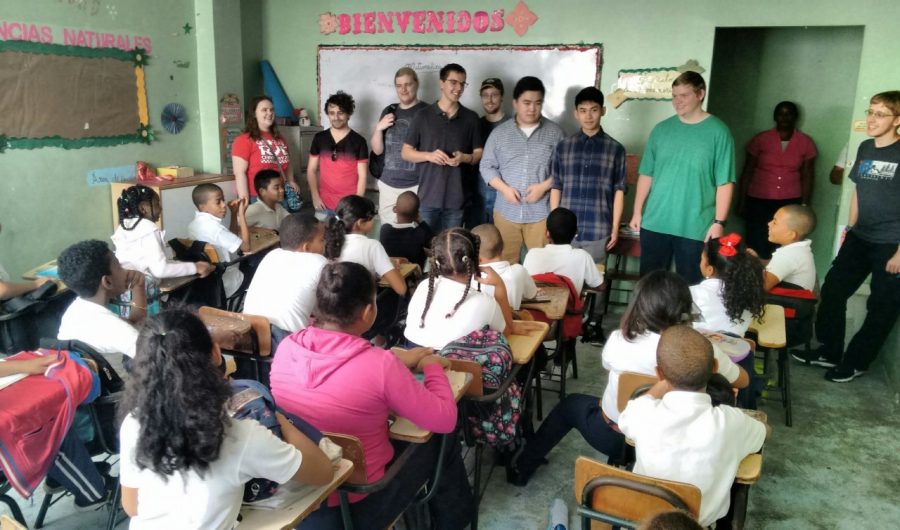Computer science students bring Raspberry Pi to schools in the Dominican Republic
The CS interim class visits a classroom in the Dominican Republic to give instruction on how to use devices they are delivering to the school.
are large, fragile, need a strong and consistent internet connection, and fail to work when they
get dust in them. A potential solution to these problems is in a different type of computer called
the Raspberry Pi. During this past interim, Calvin computer science professor Derek Schuurman
led a group of students who are computer science or information systems majors on a trip to
deliver these devices to schools in the Dominican Republic, and teach the instructors how to
use them. The Calvin trip worked with EduDeo, an organization that helps Christian schools
around the world.
“They’ve identified that a lot of schools in the majority world struggle with computing in
the classroom,” said Schuurman.
In addition to Schuurman, two of the students on the trip, junior Catherine DeJager and senior Alexander Cho, spoke to Chimes about how their trip blended missions work and computer science.
One thing that came up repeatedly was the need to embrace a mentality of collaboration
with the people, and find effective long term ways of helping.
“It’s important to work with people to avoid a savior mentality,” said DeJager. Instead, the
group focused on “training the trainers” so that local teachers could have an impact on their
students. “When I go on a missions trip now, I think ‘am I leaving a lasting impact?’” said Cho.
In the Dominican Republic, the group overcame language barriers in order to lead
workshops for the teachers, who spoke only Spanish.
“It was really great to see what [the teachers] were already doing,” said DeJager, adding
that there was a “spirit of collaboration” between the teachers.
“Learning to teach is going to help me study better,” Cho said, reflecting on how his
experiences on the trip will help him going forward.
The Raspberry Pi themselves are small, about the size of a deck of cards. This was an
advantage for the Calvin team because, as Schuurman put it, “You could carry a whole
computer lab in a carry-on!” A power outage on the team’s third day also did not harm the
Raspberry Pi.
Next year, professor Schuurman will lead another group of students to help equip
schools in Zambia with Raspberry Pi. While the activities on this trip will be almost exactly the
same as those of the Dominican Republic trip, one main difference is that the group will include
education, computer science and information systems majors. Also, there will be no language
barrier, as English is the official language of Zambia.
“Calvin received a generous grant to help fund equipment that will be donated as part of
the trip,” said Schuurman. “The grant will fund approximately 50 Raspberry Pi, monitors,
keyboards as well as other related equipment.” The grant is from a Canadian foundation
partnering with EduDeo in faith and technology. The foundation in question wishes to remain
anonymous.
“In addition, some computer sciences students are going to be working on something
called a RACHEL Pi… Rachel is an acronym for Remote Area Community Hotspot for
Education and Learning,” said Schuurman. “It’s for use in areas where there is no internet. The
RACHEL Pi becomes a hotspot, and people can connect to it and download… all kinds of
education materials.”








Emilio • Sep 28, 2019 at 8:34 am
Hello, Im a dominican proud owner of a raspberry pi 3 b+…I’ve been using it for a year now and I love it…the best device to get started on computers if you ask me. Thank you for introducing the Pi to the schools in my country!